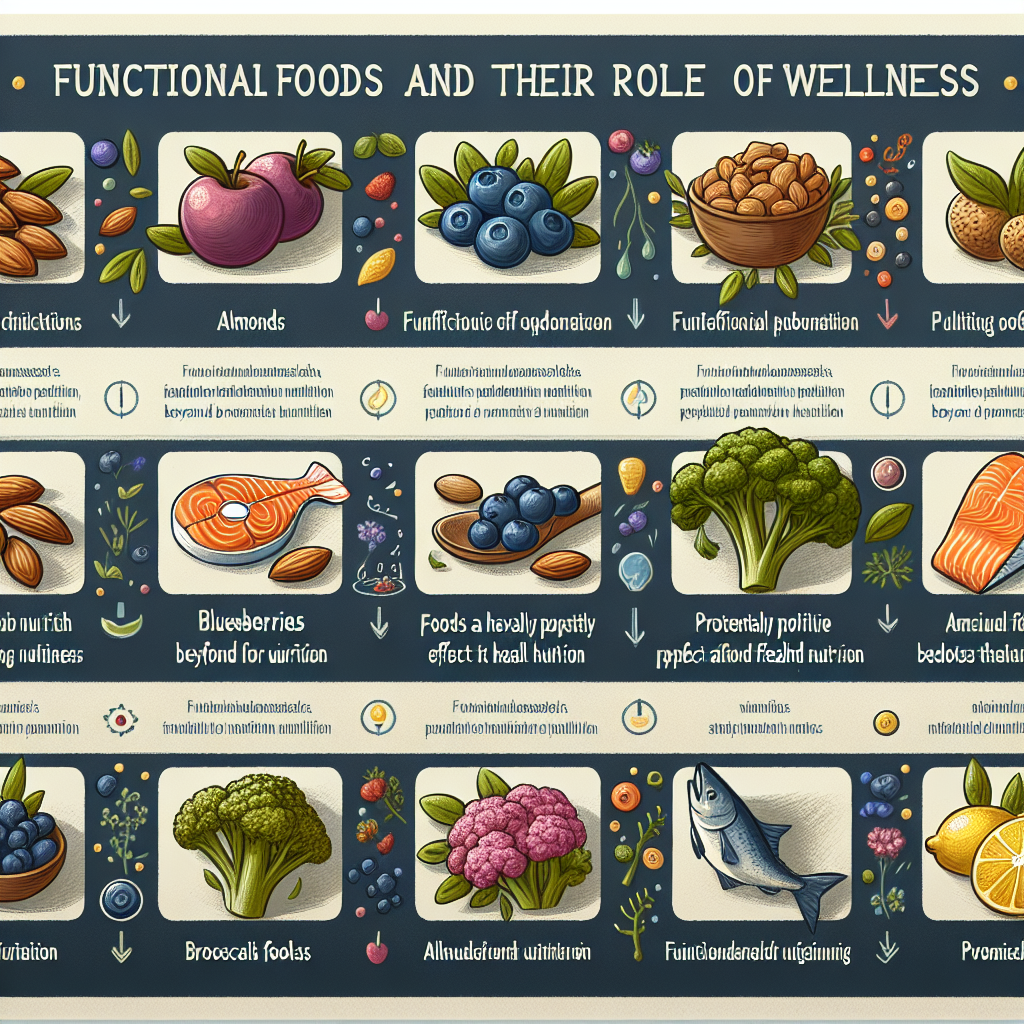Functional Foods and Their Role in Wellness

Discover more about Functional Foods and Their Role in Wellness. Enhance your health and wellness journey by understanding the importance of these nutrient-rich foods. Visit My Vibrant Vitality now to learn more.
Exploring the Health Benefits of Functional Foods in Wellness
Functional foods, a term that has been gaining traction in the health and wellness industry, refer to foods that have a potentially positive effect on health beyond basic nutrition. These foods contain bioactive compounds that provide health benefits beyond their nutritional value, contributing to overall wellness and potentially reducing the risk of chronic diseases.
The concept of functional foods is rooted in the simple idea that the food we consume should do more than just satisfy our hunger. It should also provide our bodies with the necessary nutrients to function optimally and protect us from diseases. This idea is not new; it has been a part of traditional medicine systems like Ayurveda and Traditional Chinese Medicine for centuries. However, it is only recently that modern science has begun to explore and validate the health benefits of functional foods.
Functional foods can be categorized into two groups: conventional and modified. Conventional functional foods are naturally rich in bioactive compounds. Examples include fruits and vegetables, nuts and seeds, whole grains, fish, and dairy products. On the other hand, modified functional foods are fortified or enriched with bioactive compounds. Examples include orange juice fortified with calcium or bread enriched with folic acid.
The health benefits of functional foods are numerous and varied. For instance, fruits and vegetables are packed with antioxidants, which help protect the body from damage by free radicals, unstable molecules that can cause cell damage. Whole grains are rich in dietary fiber, which aids in digestion and helps control blood sugar levels. Fish is a good source of omega-3 fatty acids, which are known to reduce inflammation and lower the risk of heart disease.
Moreover, functional foods can also play a significant role in weight management. Foods high in fiber, such as whole grains and fruits, can help you feel full longer, reducing the likelihood of overeating. Similarly, protein-rich foods like lean meats and dairy products can also contribute to feelings of satiety, helping to control hunger and support weight loss efforts.
In addition to these benefits, functional foods can also contribute to mental wellness. Certain foods, such as those rich in omega-3 fatty acids, have been linked to improved mental health. These fats are essential for brain health, contributing to mood regulation and cognitive function.
However, while the benefits of functional foods are promising, it’s important to remember that they are not a cure-all. A balanced diet, regular physical activity, adequate sleep, and stress management are all crucial components of overall wellness. Functional foods should be incorporated into a balanced diet, not used as a substitute for one.
Furthermore, while many functional foods are available in the market, not all are created equal. It’s essential to read labels carefully and choose products that are low in added sugars, sodium, and unhealthy fats.
In conclusion, functional foods offer a promising approach to enhancing overall wellness. They provide essential nutrients and bioactive compounds that can help protect against chronic diseases, support weight management, and promote mental health. However, they should be part of a balanced diet and healthy lifestyle, not a replacement for them. As research continues to uncover the health benefits of functional foods, it’s clear that these foods will play an increasingly important role in our diets and overall wellness.
The Role of Functional Foods in Promoting Overall Wellness

Functional foods, a term that has gained significant traction in the health and wellness industry, refer to foods that have a potentially positive effect on health beyond basic nutrition. They are believed to promote optimal health and help reduce the risk of disease. The role of functional foods in promoting overall wellness is a topic of growing interest among health-conscious individuals and professionals in the field of nutrition.
Functional foods are often synonymous with ‘superfoods’, a term used to describe foods that are nutrient-dense and beneficial for health and well-being. These foods are not only packed with essential vitamins and minerals but also contain disease-fighting antioxidants and phytochemicals. Examples of functional foods include fruits and vegetables, whole grains, lean proteins, and certain types of fish. These foods are naturally rich in nutrients and can help to promote overall wellness when incorporated into a balanced diet.
The role of functional foods in promoting overall wellness is multifaceted. Firstly, they provide the body with the necessary nutrients it needs to function optimally. This includes macronutrients such as proteins, carbohydrates, and fats, as well as micronutrients like vitamins and minerals. These nutrients are essential for various bodily functions, including energy production, immune function, and cellular repair.
Secondly, functional foods are rich in antioxidants and phytochemicals, which have been shown to have a protective effect against a range of diseases. Antioxidants help to neutralize harmful free radicals in the body, which can cause cellular damage and contribute to the development of chronic diseases such as heart disease and cancer. Phytochemicals, on the other hand, have been shown to have anti-inflammatory, anti-cancer, and heart health benefits.
Moreover, functional foods can play a significant role in weight management. Many functional foods are high in fiber, which can help to promote feelings of fullness and reduce overall calorie intake. This can be particularly beneficial for individuals looking to lose weight or maintain a healthy weight.
In addition to their physical health benefits, functional foods may also have a positive impact on mental health. Certain functional foods, such as fatty fish and nuts, are rich in omega-3 fatty acids, which have been shown to support brain health and may help to reduce the risk of mental health conditions such as depression and anxiety.
Despite the numerous health benefits associated with functional foods, it’s important to remember that they are not a magic bullet for health and wellness. While they can certainly contribute to overall wellness, they should be consumed as part of a balanced diet and healthy lifestyle that includes regular physical activity, adequate sleep, and stress management.
In conclusion, functional foods play a crucial role in promoting overall wellness. They provide the body with essential nutrients, help to protect against disease, support weight management, and may even contribute to mental health. By incorporating a variety of functional foods into your diet, you can help to support your overall health and well-being. However, it’s important to remember that functional foods are just one piece of the wellness puzzle, and should be combined with other healthy lifestyle habits for optimal results.
Understanding the Impact of Functional Foods on Wellness and Disease Prevention
Functional foods, a term that has gained significant traction in the health and wellness industry, refer to foods that have a potentially positive effect on health beyond basic nutrition. These foods are fortified with additional nutrients or contain naturally occurring compounds that provide health benefits beyond their nutritional value. The role of functional foods in wellness and disease prevention is a topic of growing interest among health-conscious individuals and researchers alike.
The concept of functional foods is rooted in the understanding that diet plays a critical role in overall health. It is well established that a balanced diet rich in fruits, vegetables, lean proteins, and whole grains can help maintain good health and prevent a range of chronic diseases. However, functional foods take this idea a step further by offering additional health benefits. These foods are often fortified with vitamins, minerals, probiotics, or other bioactive compounds that can help improve specific aspects of health.
For instance, consider the case of probiotic yogurt. While all yogurt provides a source of protein and calcium, probiotic yogurt also contains live bacteria that can promote gut health. Similarly, fortified orange juice not only offers a dose of vitamin C but also additional calcium and vitamin D, nutrients that are essential for bone health. These examples illustrate how functional foods can contribute to wellness by providing targeted nutritional benefits.
The potential of functional foods to prevent disease is another area of interest. Many chronic diseases, such as heart disease, diabetes, and certain types of cancer, are influenced by diet. Functional foods can play a role in disease prevention by providing nutrients that support overall health and target specific risk factors. For example, foods fortified with plant sterols or stanols can help lower cholesterol levels, reducing the risk of heart disease. Similarly, foods high in dietary fiber can help manage blood sugar levels, potentially reducing the risk of type 2 diabetes.
However, while the potential benefits of functional foods are promising, it’s important to approach this topic with a balanced perspective. Functional foods are not a magic bullet for health and should not replace a balanced, varied diet. Instead, they should be seen as a tool that can complement a healthy lifestyle. It’s also crucial to remember that while functional foods can contribute to disease prevention, they cannot cure or treat existing diseases.
Moreover, not all functional foods are created equal. Some products marketed as functional foods may be high in added sugars or unhealthy fats, which can offset their potential health benefits. Therefore, it’s essential to read food labels carefully and make informed choices.
In conclusion, functional foods offer an exciting opportunity to enhance wellness and prevent disease. By providing additional nutrients or bioactive compounds, these foods can offer targeted health benefits and complement a balanced diet. However, it’s important to approach functional foods with a balanced perspective and make informed choices. As research in this area continues to evolve, we can look forward to learning more about the potential of functional foods to contribute to health and wellness.